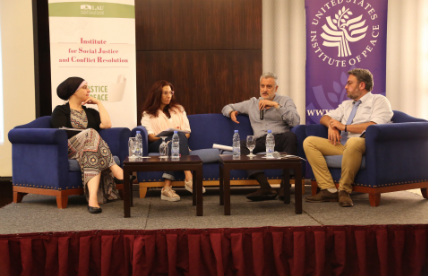ISJCR and USIP Launch Two Peacebuilding Resource Books
The United States Institute for Peace, in partnership with the Institute for Social Justice and Conflict Resolution at the Lebanese American University, recently launched two Resource Books exploring regional peacebuilding, conflict mediation, and dialogue facilitation in MENA. The event took place at the Crowne Plaza in Beirut on June 30.
The First Resource Book, written in Arabic and debuted at the launching ceremony, identifies best practices and lessons learned from regional peacebuilding case studies based on findings from members of the Middle East and North Africa Regional Facilitators Forum. The RFF is a network of regional facilitators situated in different MENA countries, and the project seeks to build the capacity of national and local facilitators to work on the ground and intervene during conflicts to promote peaceful resolutions. Friday’s event included two panels comprised of various members from the regional network who discussed the effects of political and socioeconomic factors on conflict resolution processes, as well as strategies for connecting practitioners and academicians to find best practices.

The Second Resource Book, written in English, will be peer-reviewed and published in the coming months as a co-edited volume by ISJCR Director and LAU Associate Professor Imad Salamey and USIP Associate Vice President for the Middle East and Africa Center Manal Omar. While the first book focuses on the experiences of practitioners in the field, the second book seeks to provide a different, academic approach to the question of regional peacebuilding and conflict resolution in MENA.
According to Omar, the USIP’s seeks to place regional facilitators and academics at the forefront of peacebuilding thought leadership.
“My goal is to really work with the academics but also work with the international community and the local NGOs, where the local facilitators and the people who are based in the region are actually the ones designing the interventions,” Omar said. “The way that we’re doing that is by raising awareness of the expertise and the best practices that exist.”
Omar also said that the project is building on previous facilitator networking that the organization Search for Common Ground has implemented in the region. SFCG’s Lebanon Office Project Manager Yasmine Masri, who attended the event, said she appreciates the acknowledgement of her organization’s contributions and looks forward to using the First Resource Book in their programing.
“We’re also going to be relying on [the book] maybe for future facilitation sessions and activities,” Masri said. “It’s important for us and different stakeholders and different international organizations and local organizations to actually collaborate together, because of this need for conflict transformation in our region.”
Press Coverages
- http://nna-leb.gov.lb/ar/show-news/292944/#.WV9n0dYGFz4.twitter
- https://www.lau.edu.lb/news-events/news/archive/building_peace_by_bridging_gap/
- https://www.facebook.com/Institute-for-Social-Justice-and-Conflict-Resolution-146104995494073/
- http://janoubia.com/2017/07/07/%D8%A5%D8%B7%D9%84%D8%A7%D9%82-%D9%83%D8%AA%D8%A7%D8%A8%D9%8A%D9%86-%D9%8A%D8%A8%D8%AD%D8%AB%D8%A7%D9%86-%D8%A8%D9%86%D8%A7%D8%A1-%D8%A7%D9%84%D8%B3%D9%84%D8%A7%D9%85-%D8%A7%D9%84%D8%A5%D9%82%D9%84/”